新职业英语素质篇unit3
- 格式:pdf
- 大小:1.71 MB
- 文档页数:8
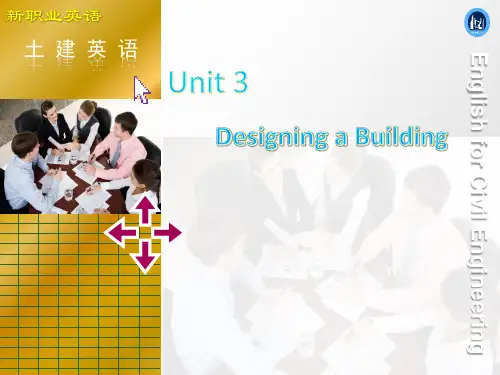

职业英语第三单元作文范文In the ever-globalizing landscape of business, the significance of professional English cannot be overstated. It is the key that unlocks the door to international collaboration and the cornerstone of effective communication within diverse teams. This essay delves into the third unit of our professional English course, which focuses on the nuances of business communication and the mastery of language skills that can elevate one's career.The third unit of our course is a pivotal chapter in the journey to becoming a proficient communicator in the professional realm. It emphasizes the importance of clarity, conciseness, and the appropriate use of jargon in business settings. Through a series of engaging lectures and interactive workshops, students are equipped with the tools necessary to navigate the complexities of professional discourse.One of the most impactful lessons from this unit is the art of writing effective emails. In today's fast-paced corporate world, email is often the first point of contact with colleagues and clients. Learning how to craft messages that are both professional and personable can significantly enhance one's professional image. The unit teaches students to structure their emails with precision, using appropriate salutations, clear subject lines, and concise body text that conveys the intended message without ambiguity.Another critical aspect covered in the third unit is the mastery of presentation skills. The ability to present ideas with confidence and clarity is a hallmark of successful professionals. Through role-playing exercises and peer evaluations, students are encouraged to hone their public speaking abilities. They learn to construct compelling narratives, use visual aids effectively, and engage their audience with a confident and dynamic delivery.Moreover, the unit delves into the subtleties of negotiation and the language of persuasion. It is here that students learn the delicate balance between assertiveness and diplomacy. They are taught to use language that builds bridges rather than walls, to understand cultural differences in communication styles, and to employ strategies that lead to mutually beneficial outcomes.The third unit also places a strong emphasis on active listening and feedback. Effective communication is not just about speaking; it is equally about listening and responding thoughtfully. Students are trained to listen attentively, to interpret non-verbal cues, and to provide constructive feedback that fosters growth and collaboration.In conclusion, the third unit of our professional English course is a transformative experience for anyone aspiring to excel in the international business arena. It is a comprehensive guide to the art of communication, providing students with the skills and confidence to communicate effectively in any professional context. As we progressthrough the course, it becomes increasingly clear that mastering professional English is not just about learning a language; it is about understanding the culture of business and the power of words to inspire, persuade, and lead.。
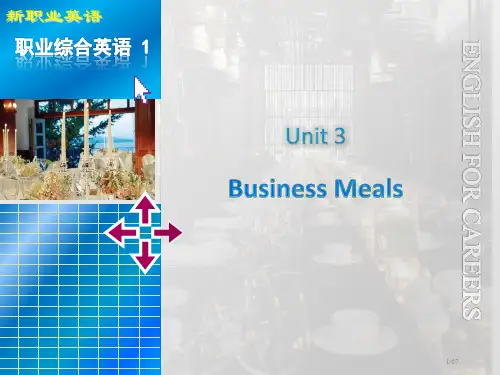
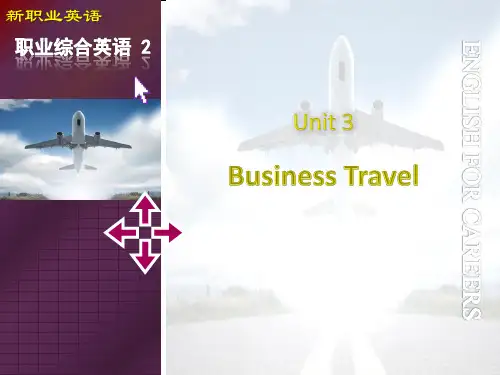

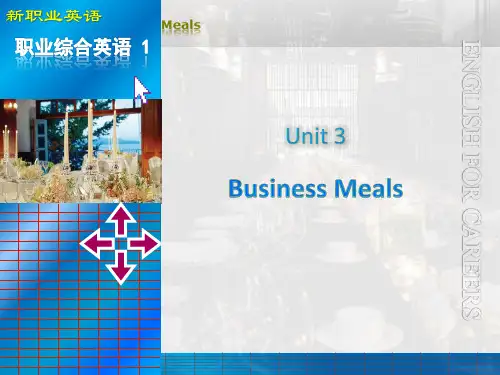


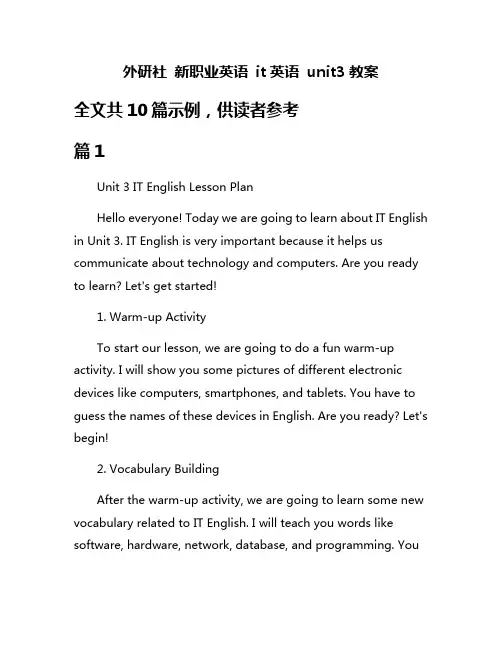
外研社新职业英语it英语unit3教案全文共10篇示例,供读者参考篇1Unit 3 IT English Lesson PlanHello everyone! Today we are going to learn about IT English in Unit 3. IT English is very important because it helps us communicate about technology and computers. Are you ready to learn? Let's get started!1. Warm-up ActivityTo start our lesson, we are going to do a fun warm-up activity. I will show you some pictures of different electronic devices like computers, smartphones, and tablets. You have to guess the names of these devices in English. Are you ready? Let's begin!2. Vocabulary BuildingAfter the warm-up activity, we are going to learn some new vocabulary related to IT English. I will teach you words like software, hardware, network, database, and programming. Youwill repeat after me to remember these words better. Are you ready? Let's start with the first word, software.3. Listening PracticeNext, we are going to do a listening practice exercise. I will play a recording of a conversation between two people talking about their favorite apps on their smartphones. You have to listen carefully and then answer some questions about the conversation. Are you ready? Let's listen to the recording now.4. Reading and Writing ActivityIn this part of the lesson, we are going to read a short passage about the history of computers. After reading the passage, you will write a summary of what you have learned. This will help you improve your reading and writing skills in English. Are you ready? Let's start reading the passage now.5. Speaking PracticeFor the speaking practice activity, we are going to do a role play exercise. I will pair you up with a classmate and give you a scenario to act out. For example, one of you will be a customer calling tech support for help with a computer problem, and the other will be the tech support agent. This will help you practicespeaking English in a real-life situation. Are you ready? Let's begin the role play exercise.6. Review and HomeworkAt the end of the lesson, we will review everything we have learned about IT English. I will ask you some questions to see how much you have understood. For homework, I will ask you to write a short paragraph about your favorite electronic device and why you like it. This will help you practice writing in English outside of the classroom. Are you ready to review and do your homework? Let's finish the lesson strong!That's it for today's IT English lesson. I hope you had fun learning about technology and computers. Remember to practice your English every day to improve your skills. See you next time! Bye bye!篇2Hello everyone! Today, we are going to talk about the lesson plan for Unit 3 of the New Dynamic English IT English textbook.First, let's start with a warm-up activity to get our brains thinking about IT English. We can watch a short video clip aboutdifferent IT professions and discuss what we see. This will help us get familiar with the topic and vocabulary.Next, we will move on to the vocabulary section. We will learn new words related to IT jobs such as programmer, web designer, and IT technician. We can play games like charades or memory matching to practice and reinforce our knowledge of these words.After that, we will dive into the grammar part of the lesson. We will learn about different verb tenses used in the context of IT jobs. For example, we will learn how to talk about past experiences, present responsibilities, and future goals in the IT industry.Following the grammar section, we will do a reading comprehension activity. We will read a short passage about a day in the life of an IT professional and answer questions to check our understanding. This will help us improve our reading skills and learn more about the daily tasks of IT workers.Finally, we will wrap up the lesson with a fun project. We can work in groups to create a presentation about our dream IT job. We can use our imagination to come up with creative ideas and present them to the class. This activity will give us a chance topractice our speaking and listening skills while also showcasing our knowledge of IT English.That's all for today's lesson plan! I hope you are excited to learn more about IT English and explore the world of technology. Let's get started and have a great time learning together! Thank you for listening!篇3Hi everyone, today I’m going to share with you our lesson plan for Unit 3 of the New Dynamic English IT English textbook. Are you ready? Let’s dive in!First, we’ll start with the warm-up activity. We’ll have a quick discussion about different IT jobs and what they involve. For example, we can talk about what a software developer does, or what a data analyst does. It’s important for us to understand the different roles in the IT industry.Next, we’ll move on to the vocabulary section. We’ll learn some key words and phrases related to IT jobs, such as “programming”, “networking”, and “cybersecurity”. We’ll practice saying and writing these words to make sure we remember them.After that, we’ll do a reading activity. We’ll read a short passage about a day in the life of an IT professional. We’ll discuss what we learned from the passage and answer some questions to test our understanding.Then, we’ll do a listening activity. We’ll listen to a conversation between two IT professionals discussing a new project. We’ll answer some questions about the conversation to check our listening skills.Finally, we’ll finish the lesson with a speaking act ivity. We’ll work in pairs to role-play a job interview for an IT position. We’ll take turns being the interviewer and the interviewee, and practice asking and answering questions about our skills and experience.That’s it for today’s lesson plan. I hope you’re excited to learn more about IT English and the exciting career opportunities in the IT industry. Let’s work hard and have fun learning together!篇4Unit 3: Jobs in ITHello everyone! Today, we are going to talk about some cool jobs in IT. IT stands for Information Technology, which is all about using computers and technology to do cool stuff.1. What is IT?IT is a field that uses computers to store, retrieve, transmit, and manipulate data. It includes everything from designing websites to creating video games to fixing computer problems.2. Jobs in ITThere are lots of different jobs you can do in IT. Here are a few examples:- Web Developer: A web developer designs and creates websites. They need to know programming languages like HTML, CSS, and JavaScript.- Software Engineer: A software engineer designs and develops computer programs. They work on things like apps, games, and operating systems.- Network Administrator: A network administrator manages computer networks, making sure they are running smoothly. They also help with things like setting up new devices and troubleshooting problems.- IT Support Specialist: An IT support specialist helps people with computer problems. They answer questions, fix issues, and teach people how to use technology.3. Why IT?There are lots of reasons why IT is a great field to work in. For one, it's always changing and evolving, so there are always new things to learn. Plus, IT jobs are in high demand, so you can make a good salary and have lots of job opportunities.4. How to Get StartedIf you're interested in a career in IT, there are lots of ways to get started. You can take classes in computer science or IT, get certifications in specific areas, or even teach yourself by practicing coding and building projects.So, there you have it! IT is a fun and exciting field with lots of cool jobs to choose from. Whether you want to design websites, develop apps, or help people with tech problems, there's something in IT for everyone. Good luck on your IT journey!篇5Title: My Lesson Plan for Unit 3 of New Dynamic English IT EnglishHi everyone! Today I want to share with you my super cool lesson plan for Unit 3 of New Dynamic English IT English. This unit is all about talking about technology and the internet, so get ready to learn some awesome new vocab and phrases! Let's dive in!1. Warm-up (10 minutes)To start off the lesson, I'll ask the students to talk about their favorite apps and websites. They can share with the class what they like to do online and why. This will get them thinking about the topic of the lesson and help them practice their speaking skills.2. Introduction to New Vocabulary (15 minutes)Next, I'll introduce the new vocabulary words for this unit. We'll learn words like "browser," "download," "upload," and "firewall." I'll make sure to explain each word clearly and give examples so that the students can understand and remember them.3. Reading and Comprehension (20 minutes)After learning the new vocabulary, we'll read a text together about online security. The students will read the text out loud,and then we'll discuss it as a class. I'll ask questions to check their understanding and encourage them to share their opinions.4. Speaking Practice (15 minutes)In this part of the lesson, the students will work in pairs to practice using the new vocabulary and phrases. I'll give them a list of questions to ask each other, like "Have you ever had a virus on your computer?" and "What do you do to protect your online privacy?" This will help them practice speaking and listening skills.5. Writing Activity (20 minutes)To wrap up the lesson, the students will write a short paragraph about their experience with technology. They can talk about their favorite devices, apps, and websites, as well as any challenges they've faced online. I'll remind them to use the new vocabulary and phrases we've learned in class.6. Homework (5 minutes)For homework, I'll ask the students to research a new technology trend or innovation and write a short report about it. They can present their findings to the class in the next lesson. This will help them practice their research and presentation skills.I hope you like my lesson plan for Unit 3 of New Dynamic English IT English. Let's have a great lesson together and learn lots of cool new things! Thank you for listening!篇6Unit 3 Lesson PlanHello everyone! Today we are going to learn about IT English in our New Horizon English textbook. Are you ready? Let's get started!Objective:- Learn new vocabulary related to IT- Understand different jobs in the IT industry- Practice listening and speaking skills in EnglishWarm-up:Let's start by asking a question: Do you know what IT means? IT stands for Information Technology. It's all about computers and technology!Vocabulary:1. Computer Programmer - someone who writes code to create computer software2. Web Designer - someone who designs websites3. Network Administrator - someone who manages computer networks4. Data Analyst - someone who analyzes data to find patterns and trends5. IT Support - someone who helps people with computer problems6. Software Engineer - someone who designs and develops softwareIntroduction:Now that we know the vocabulary, let's talk about different jobs in the IT industry. You can be a computer programmer and write code like a wizard! Or you can be a web designer and create beautiful websites. There are so many cool jobs in IT!Activities:1. Role-play: Let's pretend we are computer programmers writing code. Use your imagination and create a program!2. Drawing: Draw a picture of a website as a web designer. Be creative and make it look awesome!3. Group discussion: Talk about different IT jobs and choose one that you would like to do in the future.Listening:Listen to a recording about IT jobs and try to understand the different roles in the IT industry. Pay attention to the vocabulary we learned earlier!Conclusion:Great job, everyone! Today we learned a lot about IT English and different jobs in the IT industry. Keep practicing your English skills and you will become a master in IT!Homework:Write a short paragraph about your favorite IT job and why you would like to do it in the future. Don't forget to use the vocabulary we learned in class!That's all for today. See you next time! Happy learning!篇7Title: My Lesson Plan for Unit 3 of New Dynamic English IT EnglishHey guys, today I’m going to share with you my lesson plan for Unit 3 of the New Dynamic English IT English course. This unit is all about learning new vocabulary and phrases related to IT, so let’s get started!First, we are going to start the lesson with a fun warm-up activi ty. We will play a game called “IT Vocabulary Memory Match”. I will make cards with IT-related words on one side and their meanings on the other side. Students will work in pairs to match the words with their meanings. This will help them review the vocabulary they learned in the previous lesson.Next, we will move on to the new vocabulary in Unit 3. I will introduce words like “software”, “hardware”, “network”, “database”, and “programming”. I will use flashcards and pictures to help students understand the meaning of each word. We will practice pronouncing the words together to improve their pronunciation.After learning the new vocabulary, we will do a listening activity. I will play a short audio clip about a computer programmer talking about his job. Students will listen carefully and answer some questions about the audio. This will help them improve their listening skills and learn more about IT professions.Then, we will do a speaking activity where students will practice using the new vocabulary in sentences. I will ask them questions like “What software do you use for editing photos?” or “Have you ever programmed a computer game?”. This will give them the opportunity to practice speaking in English and apply the new vocabulary they learned.To wrap up the lesson, we will do a fun group activity. I will divide the class into teams and give them a scenario where they have to work together to solve an IT-related problem. This will encourage teamwork and collaboration among students while applying the new vocabulary in a real-world situation.I hope you guys are excited about my lesson plan for Unit 3 of the New Dynamic English IT English course. Let’s have a great lesson and learn more about the fascinating world of IT together!篇8Title: Let's Learn IT English Together!Hey guys! Today we are going to learn all about IT English in Unit 3 of our New Professional English textbook from Foreign Language Teaching and Research Press. Are you ready? Let's get started!First, we are going to learn about different IT jobs. Do you know what a database administrator does? They help to organize and store data in a database. It's like being a librarian for computers! And what about a network engineer? They help set up and maintain computer networks. Like a builder for the internet!Next, we will learn some common IT English phrases. For example, "Can you troubleshoot this problem for me?" means can you help me figure out what's wrong with this computer? And "I need to back up my files" means I need to make a copy of my important documents. These phrases will be super useful when you are working in IT!After that, we will practice some IT vocabulary. We will learn words like firewall, malware, and encryption. These words may sound a bit tricky, but don't worry, we will go through them together and you will soon be an IT expert!Finally, we will do some fun activities to test our IT English skills. We will have quizzes, games, and even act out some IT scenarios. It's going to be so much fun, I promise!So, are you excited to learn IT English with me? Let's dive into Unit 3 and become IT superstars together! Remember,practice makes perfect, so keep studying and soon you'll be fluent in IT English. Good luck and let's get started!篇9Unit 3: Jobs and ProfessionsHello everyone! Today we are going to talk about jobs and professions in our English class. Are you ready? Let's get started!1. Warm-up activity:To start our lesson, we can play a fun game called "Guess the Profession". I will give you clues about a specific job and you have to guess what it is. For example, I help sick people feel better. What am I? That's right, I'm a doctor! Let's continue with more professions.2. Vocabulary practice:Now, let's learn some new words related to jobs and professions. Repeat after me:- Teacher- Chef- Police officer- Firefighter- Nurse- Engineer- Pilot- Actor- AthleteGreat job! Now, let's match each profession with its definition. Who can give me an example of a person who does each job?3. Reading comprehension:Next, we will read a short story about a boy who wants to become a pilot when he grows up. Let's read the story together and answer some questions about it. What are the requirements for becoming a pilot? Why does the boy dream of flying a plane?4. Role-play activity:In groups of two or three, you will act out a dialogue between a customer and a salesperson in a store. One of you will play the customer who wants to buy a new phone, and the other will play the salesperson who explains the features of different models. Be creative and use the vocabulary we learned earlier!5. Writing task:Lastly, you will write a short paragraph about your dream job. What do you want to be when you grow up and why? Describe the responsibilities of that profession and why it interests you. Remember to use the vocabulary we practiced earlier in your writing.I hope you enjoyed today's lesson about jobs and professions. Remember, it's important to work hard and follow your dreams. Keep practicing your English and you can achieve anything you set your mind to. See you next time!篇10Unit 3: Jobs in ITHello everyone! Today we are going to talk about some cool jobs in IT. Do you know what IT stands for? IT stands for Information Technology. It's all about computers and technology. Let's learn more about it together!First, let's talk about a job called a software developer. A software developer is a person who creates and designs computer programs. They make all the cool apps and games that we love to play on our devices. They need to know how to codeand come up with new ideas for software. It's a really fun job for people who like to be creative!Next, let's learn about a job called a cybersecurity analyst. A cybersecurity analyst is like a detective for computers. They protect systems and networks from cyber attacks. They make sure that our information is safe and secure. It's a very important job in today's digital world.Another cool job in IT is a data scientist. A data scientist is someone who analyzes and interprets complex data. They use data to help companies make better decisions and understand their customers. They need to be good at math and computer programming. It's a job for people who love working with numbers and solving problems.Finally, let's talk about a job called a UX designer. A UX designer is a person who creates user-friendly interfaces for websites and apps. They think about how users will interact with the technology and make sure it's easy to use. They need to be creative and have a good eye for design. It's a job that combines art and technology.In conclusion, there are so many cool jobs in IT that you can explore. Whether you like coding, analyzing data, or designing interfaces, there is something for everyone in the world ofInformation Technology. Who knows, maybe one day you'll be the next big software developer or cybersecurity expert! Keep learning and exploring new things, and you'll go far in the world of IT.That's all for today, see you next time! Bye bye!。
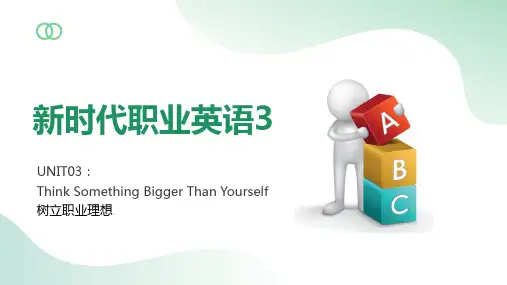

新职业英语第一版unit3答案1、While my mother _______ the supper, my father came back. [单选题] *A. cooksB. is cookingC. was cooking(正确答案)D. has cooked2、Where have you _______ these days? [单选题] *A. been(正确答案)B. beC. isD. are3、32.Mr. Black is ______ now, so he wants to go to a movie with his son. [单选题] * A.busyB.free(正确答案)C.healthyD.right4、30.I want to find ______ and make much money. [单选题] *A.worksB.jobC.a job(正确答案)D.a work5、--_______ I borrow these magazines?--Sorry, only the magazines over there can be borrowed. [单选题] *A. MustB. WouldC. May(正确答案)D. Need6、19._______ will the film Country Road last? [单选题] *A.How farB.How oftenC.How soonD.How long(正确答案)7、The more he tried to please her, _____she seemed to appreciate it. [单选题] *A.lessB.lesserC.the less(正确答案)D.the lesser8、34.My mother isn't in now, but she will be back ______ ten minutes. [单选题] *A.forB.beforeC.in(正确答案)D.at9、It’s windy outside. _______ your jacket, Bob. [单选题] *A. Try onB. Put on(正确答案)C. Take offD. Wear10、Will you see to()that the flowers are well protected during the rainy season? [单选题] *A. it(正确答案)B. meC. oneD. yourself11、He couldn’t ______ the maths problem without your help. [单选题] *A. work out(正确答案)B. work atC. work forD. work with12、They lost their way in the forest, and _____ made matters worse was night began to fall. [单选题] *A. thatB. itC. what(正确答案)D. which13、--How is your friend coming?--I’m not sure. He _______ drive here. [单选题] *A. may(正确答案)B. canC. mustD. will14、Our school is beautiful. How about _______? [单选题] *A. theirs(正确答案)B. theirC. theyD. them15、Kids will soon get tired of learning _____ more than they can. [单选题] *A. if they expect to learnB. if they are expected to learn(正确答案)C. if they learn to expectD. if they are learned to expect16、()of the twins was arrested because I saw them both at a party last night. [单选题] *A. NoneB. BothC. Neither(正确答案)D. All17、72.—? ? ? ? ? ? ? ? ? ? ? ??—Yes, please. I want a sweater. [单选题] *A.How muchB.Can I help you(正确答案)C.Excuse meD.What will you take18、Though my best friend Jack doesn’t get()education, he is knowledgeable. [单选题] *A. ManyB. littleC. fewD. much(正确答案)19、If you do the same thing for a long time, you'll be tired of it. [单选题] *A. 试图B. 努力C. 厌倦(正确答案)D. 熟练20、English is very important in our daily life. Never _______. [单选题] *A. give up itB. give it up(正确答案)C. give away itD. give it away21、33.Will Mary's mother ______ this afternoon? [单选题] * A.goes to see a filmB.go to the filmC.see a film(正确答案)D.goes to the film22、43.How much did you ________ the man for the TV? [单选题] * A.pay(正确答案)B.takeC.spendD.buy23、Three ______ died of water pollution last winter. [单选题] *A. hundreds of villagersB. hundred villagers(正确答案)C. hundreds villagersD. hundred of villagers24、If you do the same thing for a long time, you'll be tired of it. [单选题] *A. 试图B. 努力C. 厌倦(正确答案)D. 熟练25、I don’t know how to improve my English. Can I ask you for some _______? [单选题] *A. answersB. advice(正确答案)C. questionsD. words26、The idea of working abroad really()me. [单选题] *appeals to (正确答案)B. attaches toC. adapts toD. gets across27、25.A watch is important in our life. It is used for ______ the time. [单选题] * A.telling (正确答案)B.sayingC.speakingD.holding28、39.—What do you ________ my new dress?—Very beautiful. [单选题] * A.look atB.think aboutC.think of(正确答案)D.look through29、The trouble turned out to have nothing to do with them. [单选题] *A. 由…引发的B. 与…有牵连C. 给…带来麻烦D. 与…不相干(正确答案)30、92.China is a big country ________ a long history. [单选题] *A.hasB.haveC.with(正确答案)D.there is。